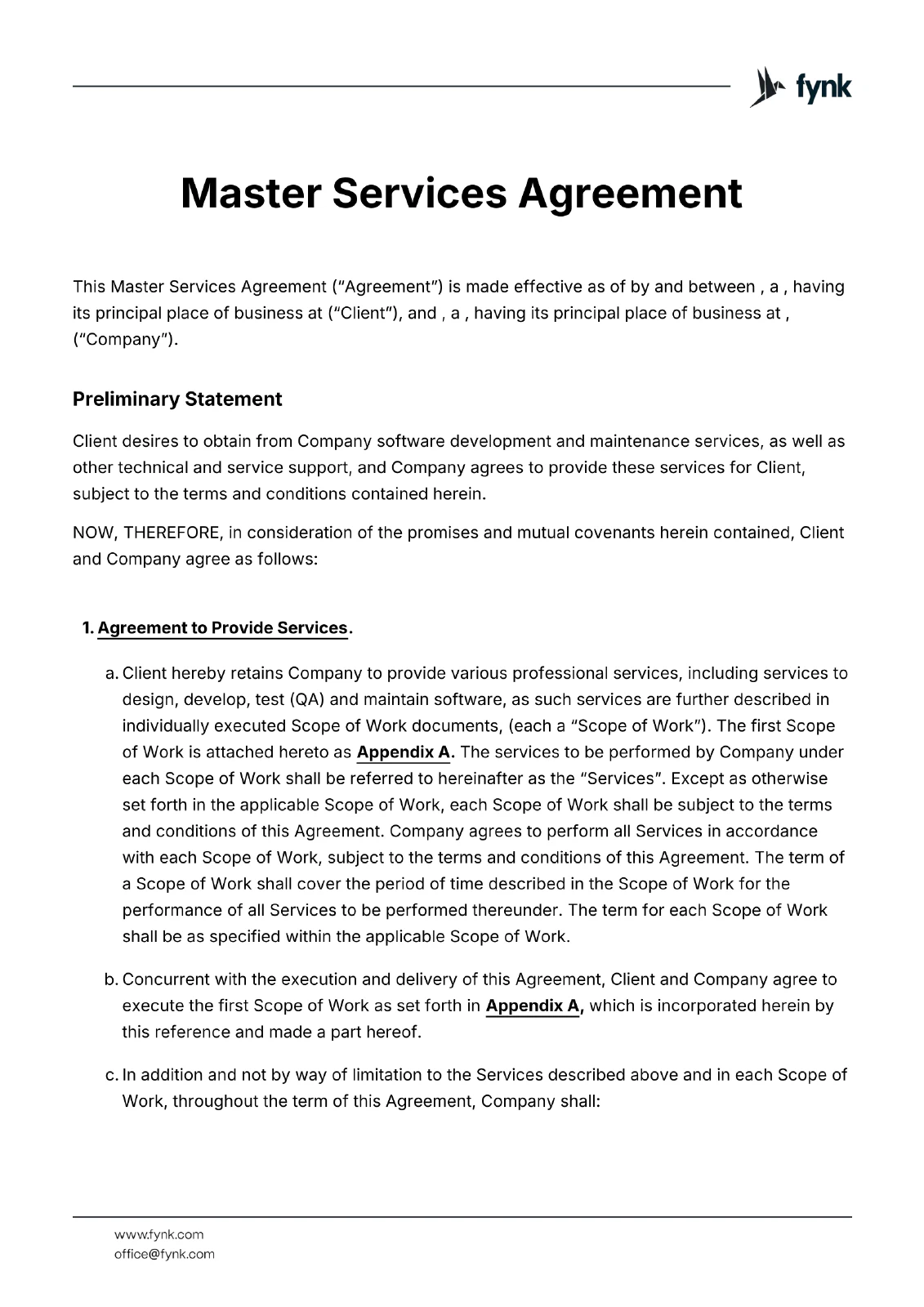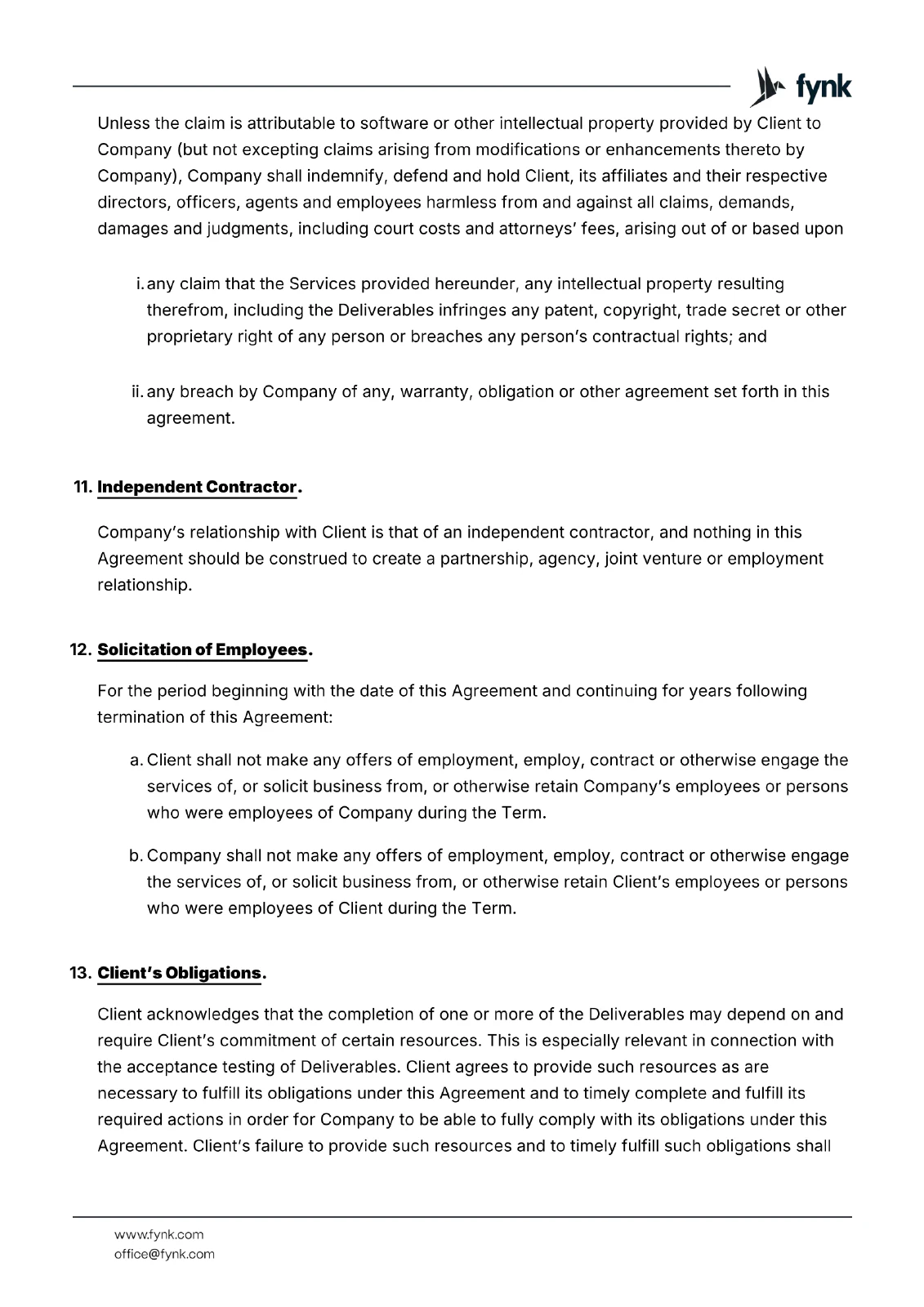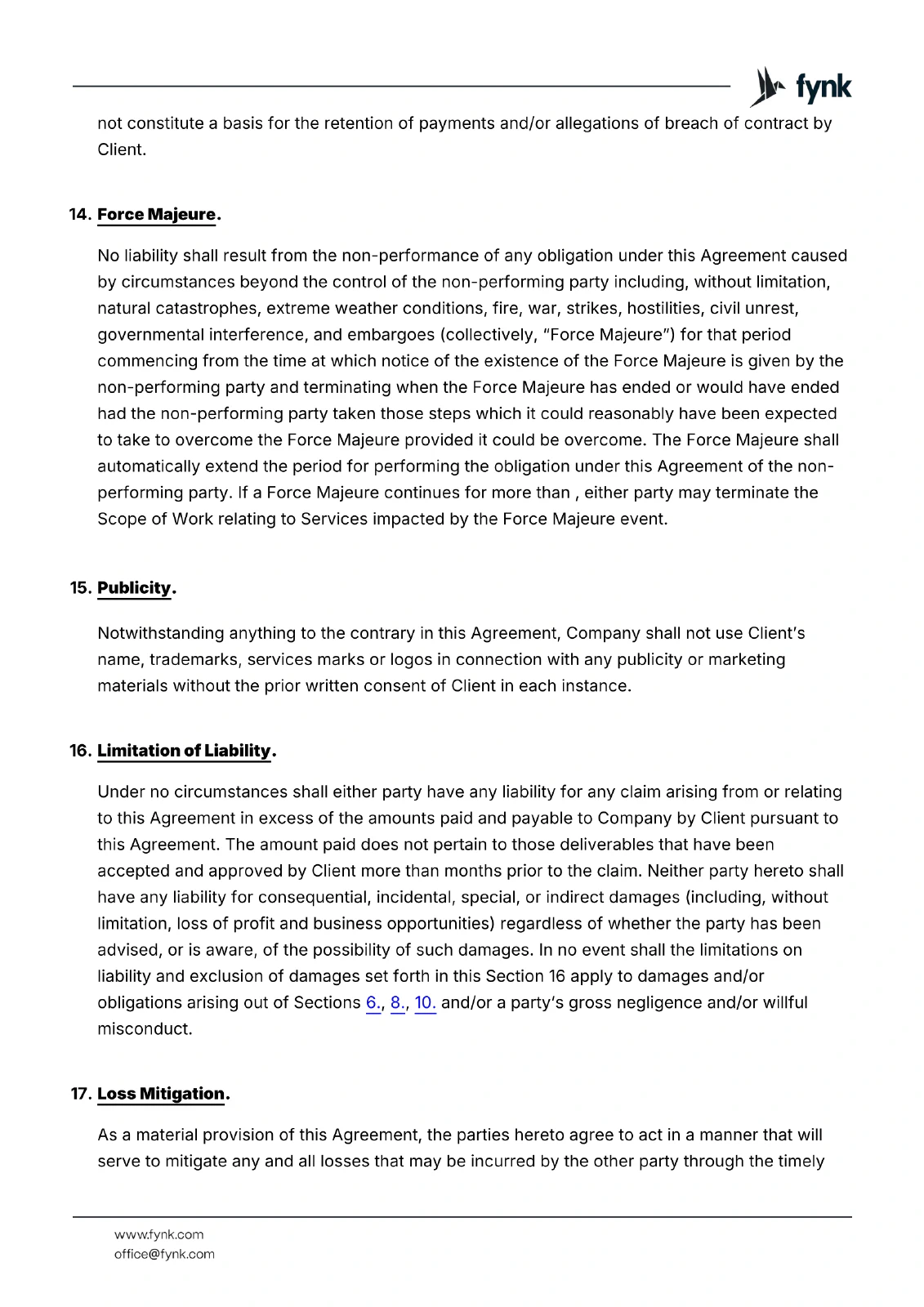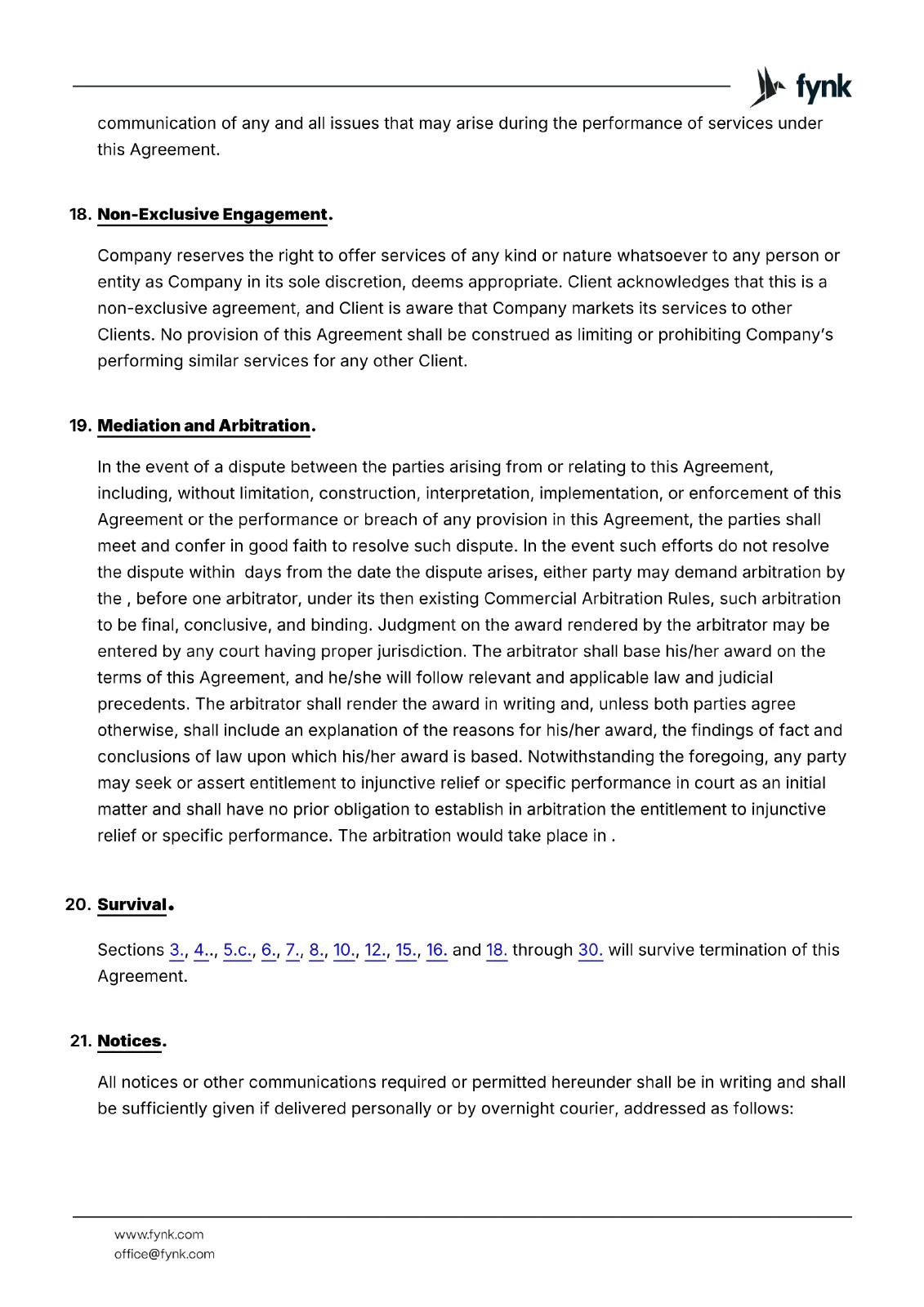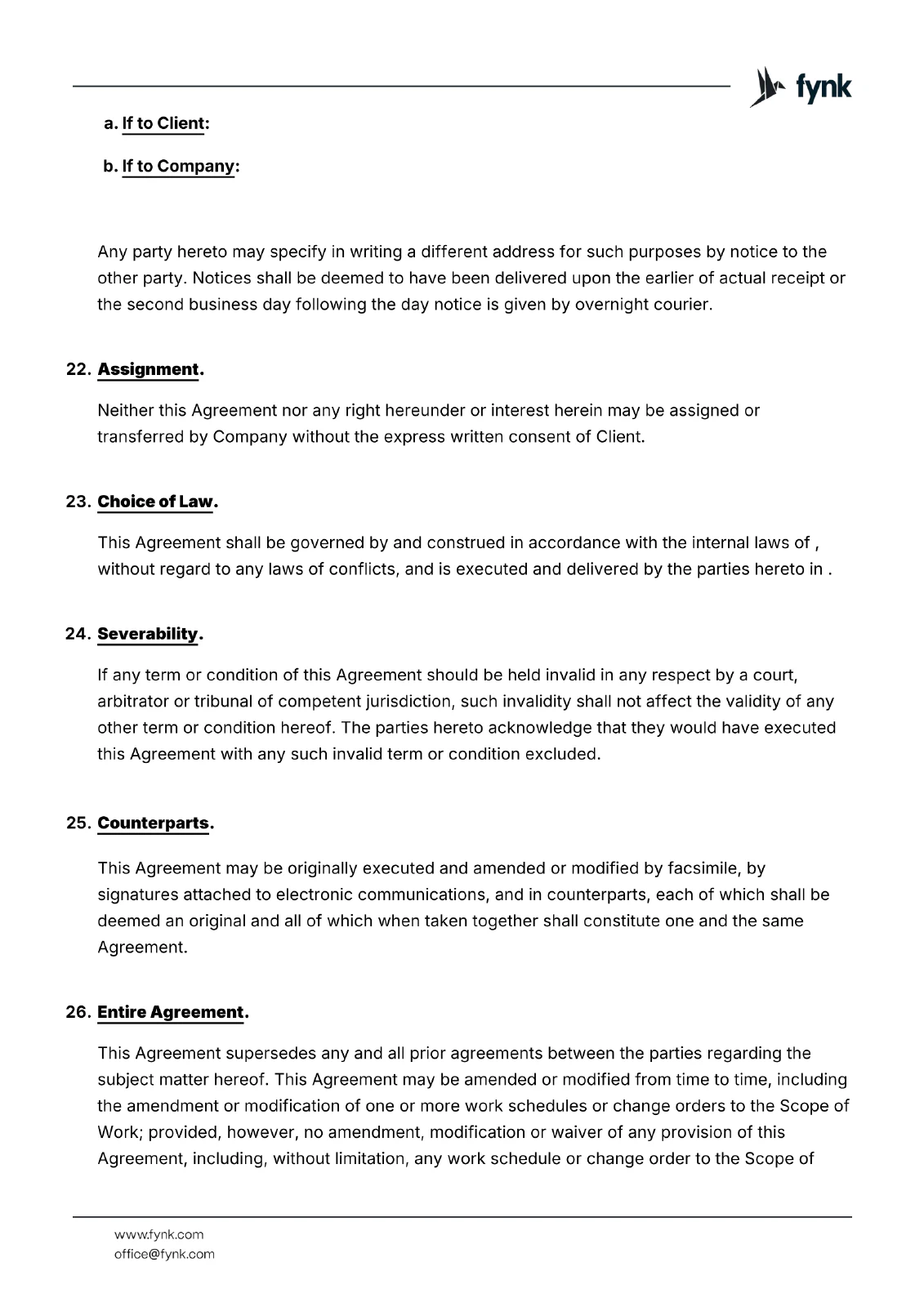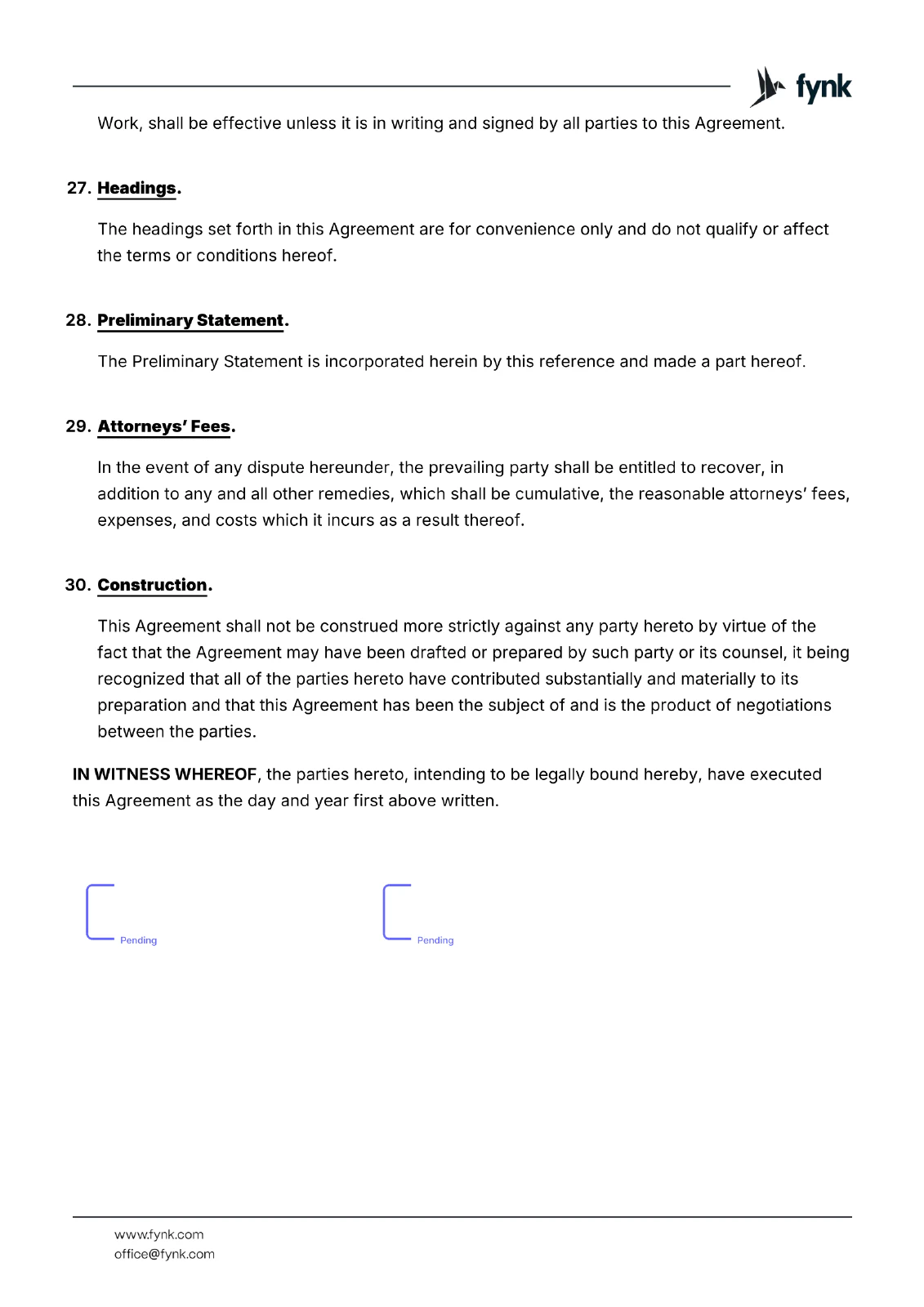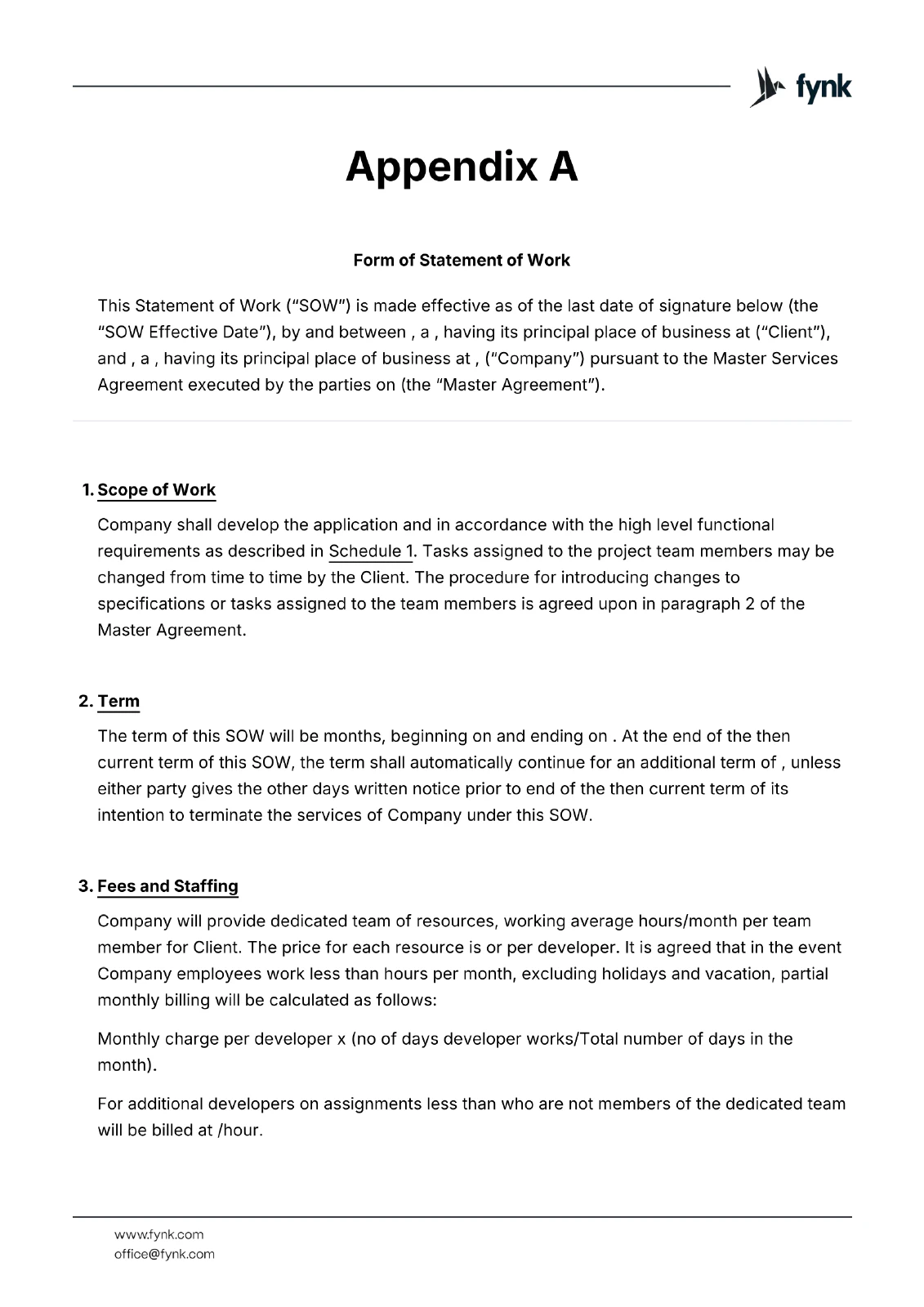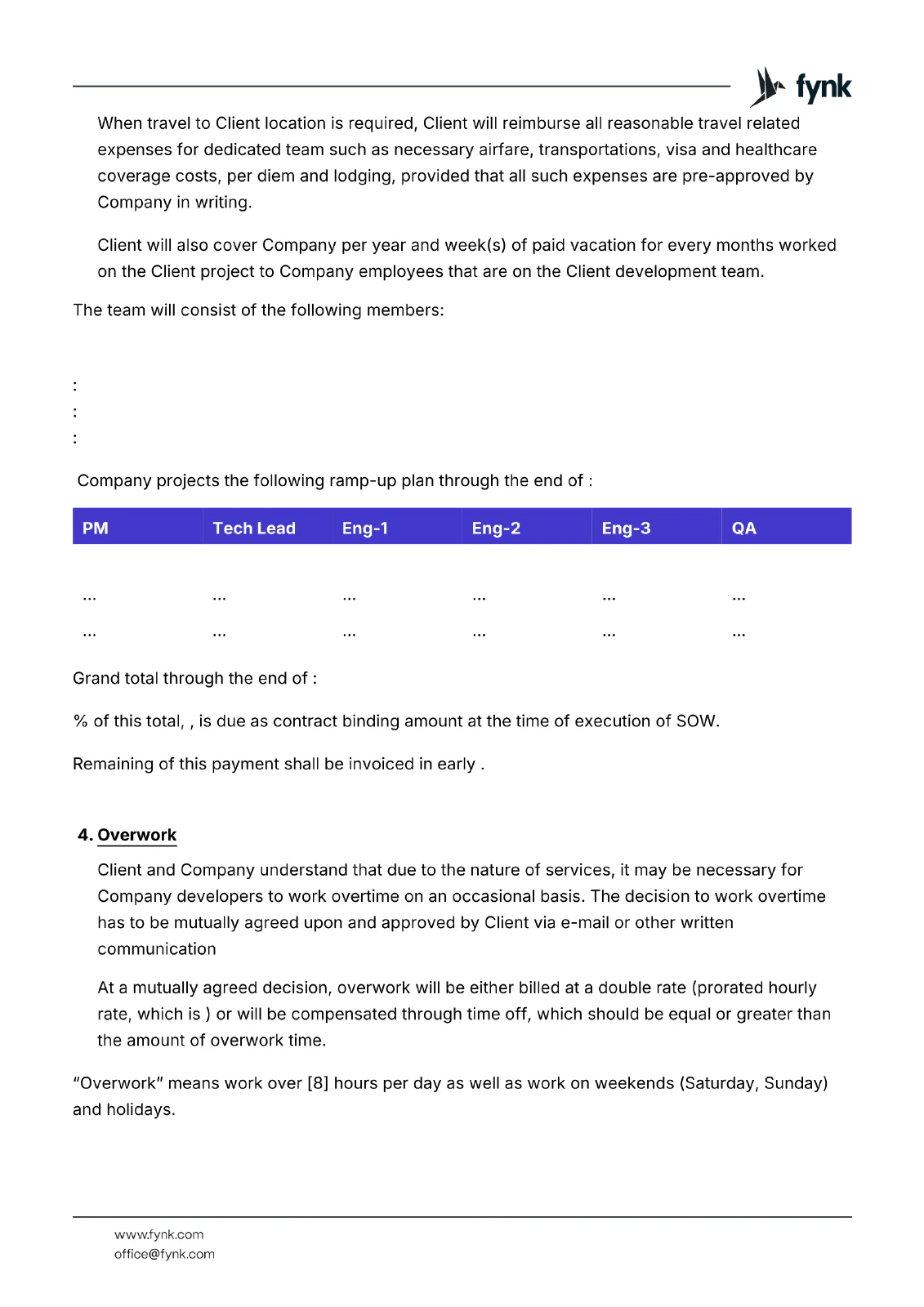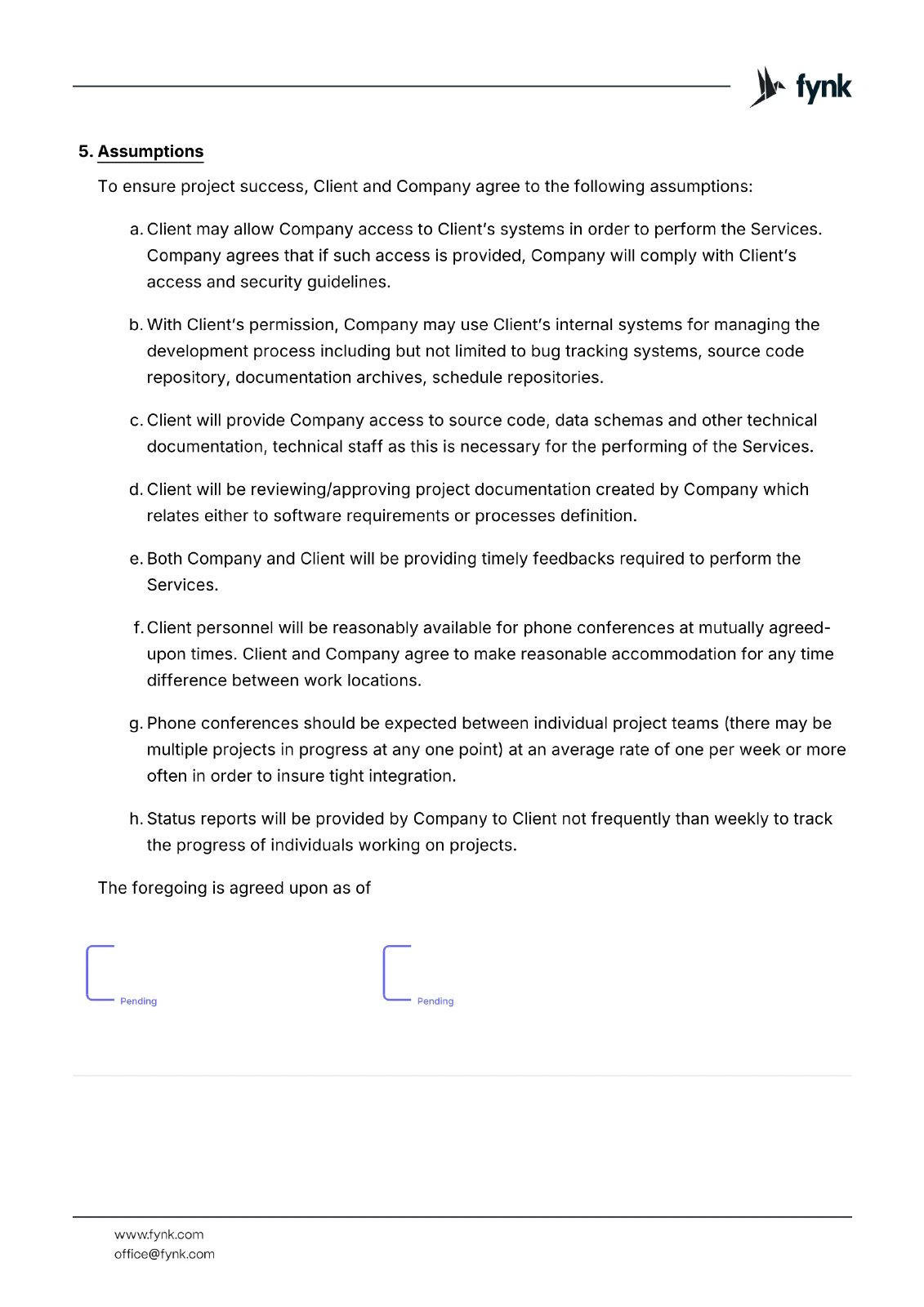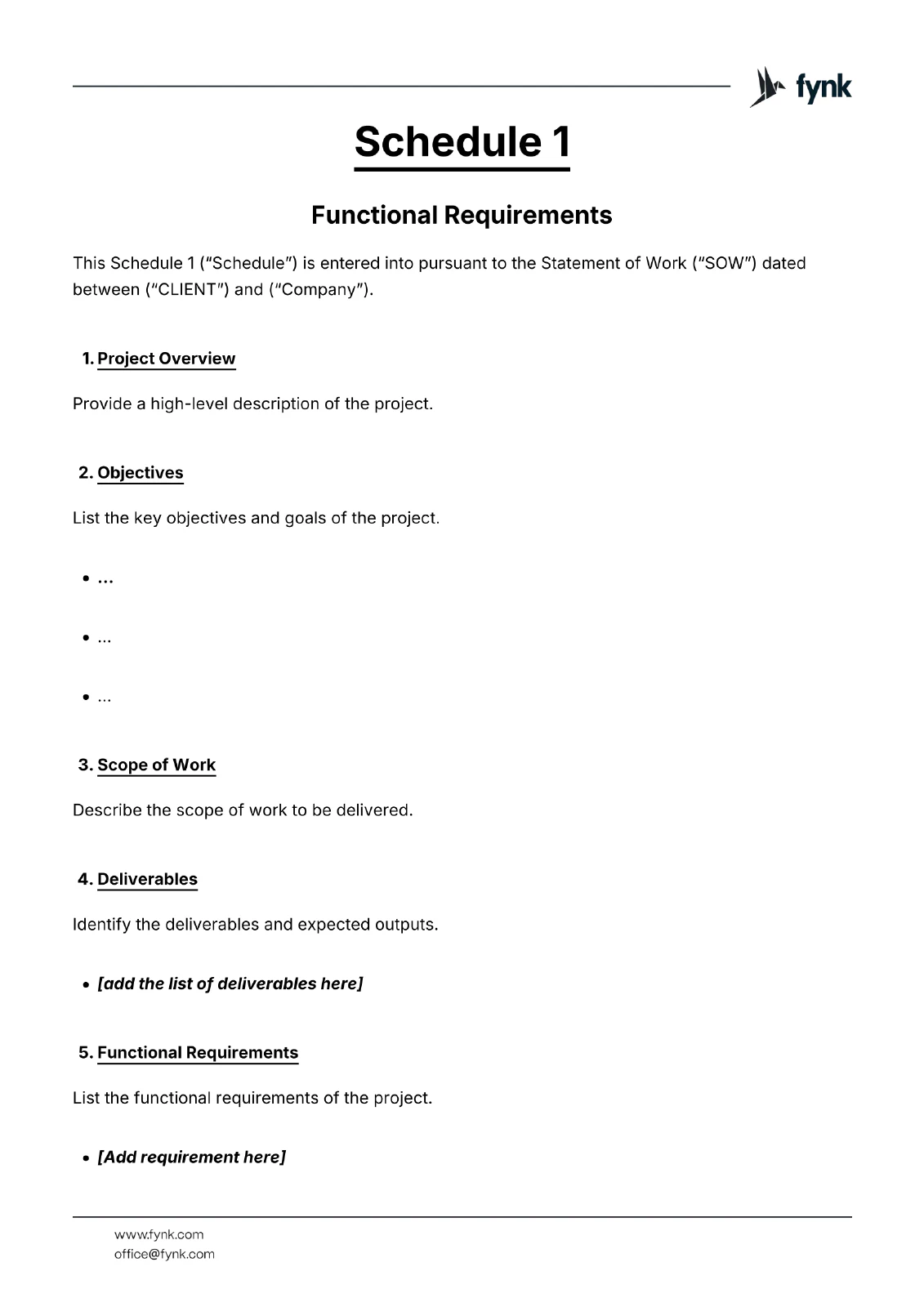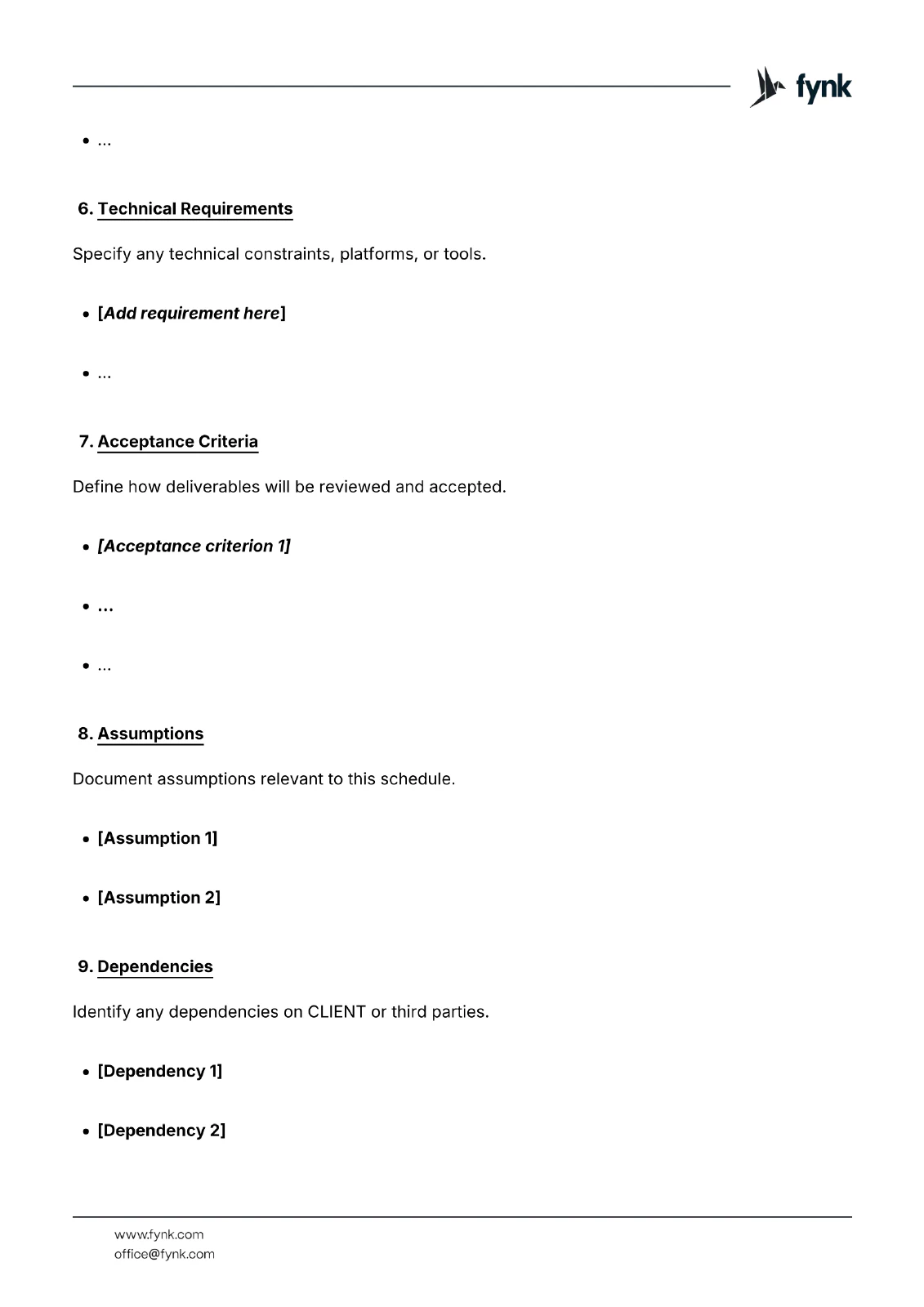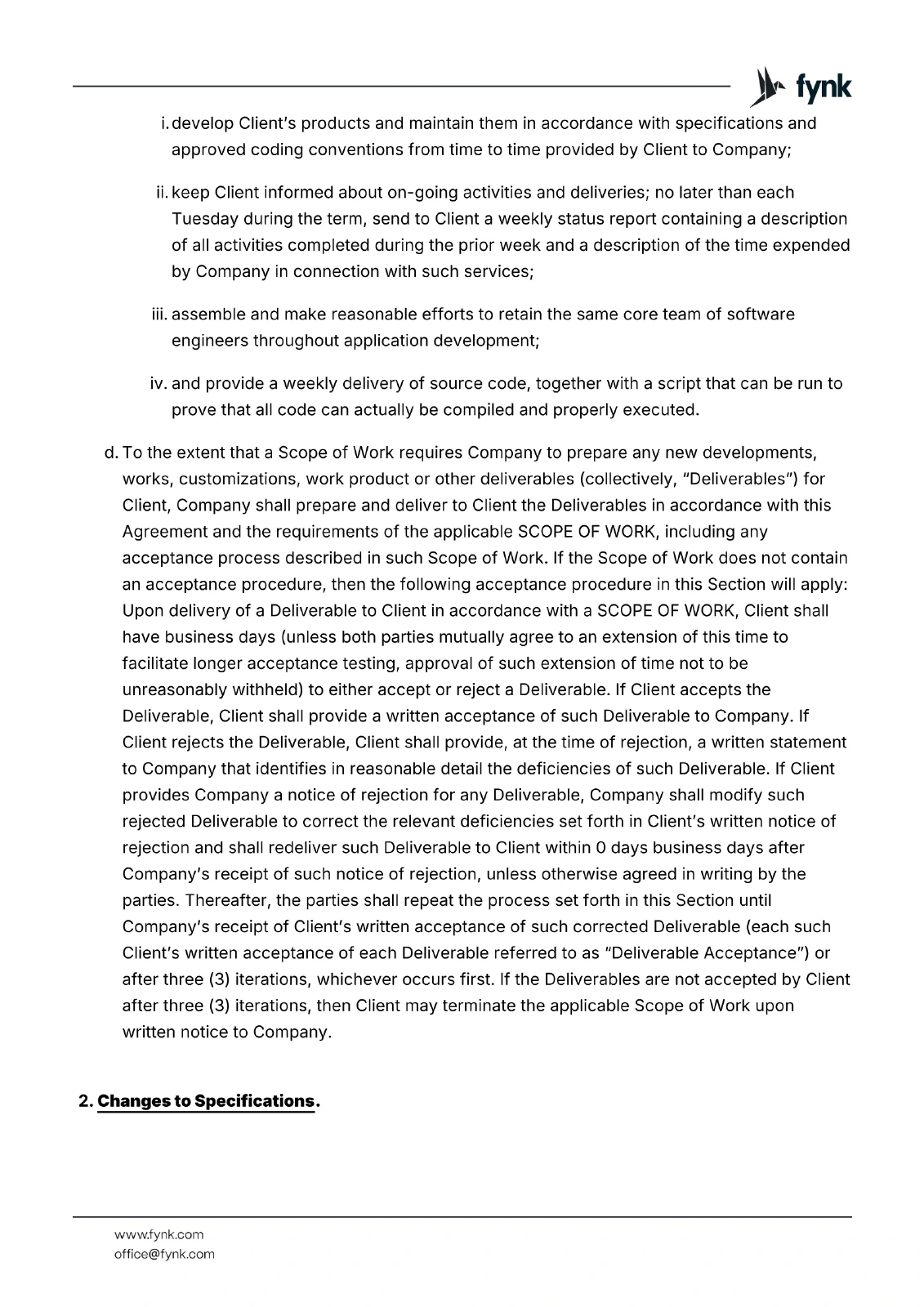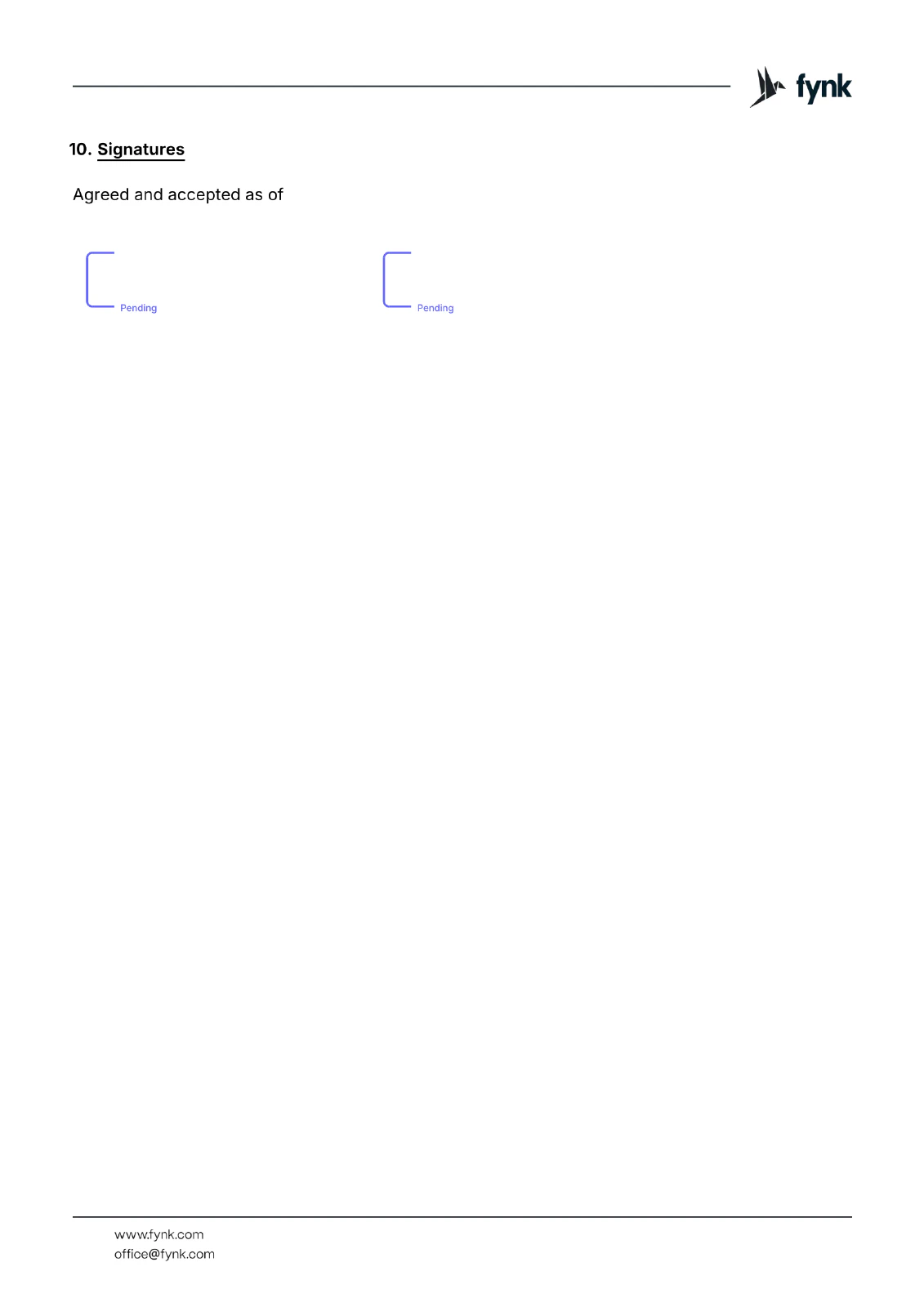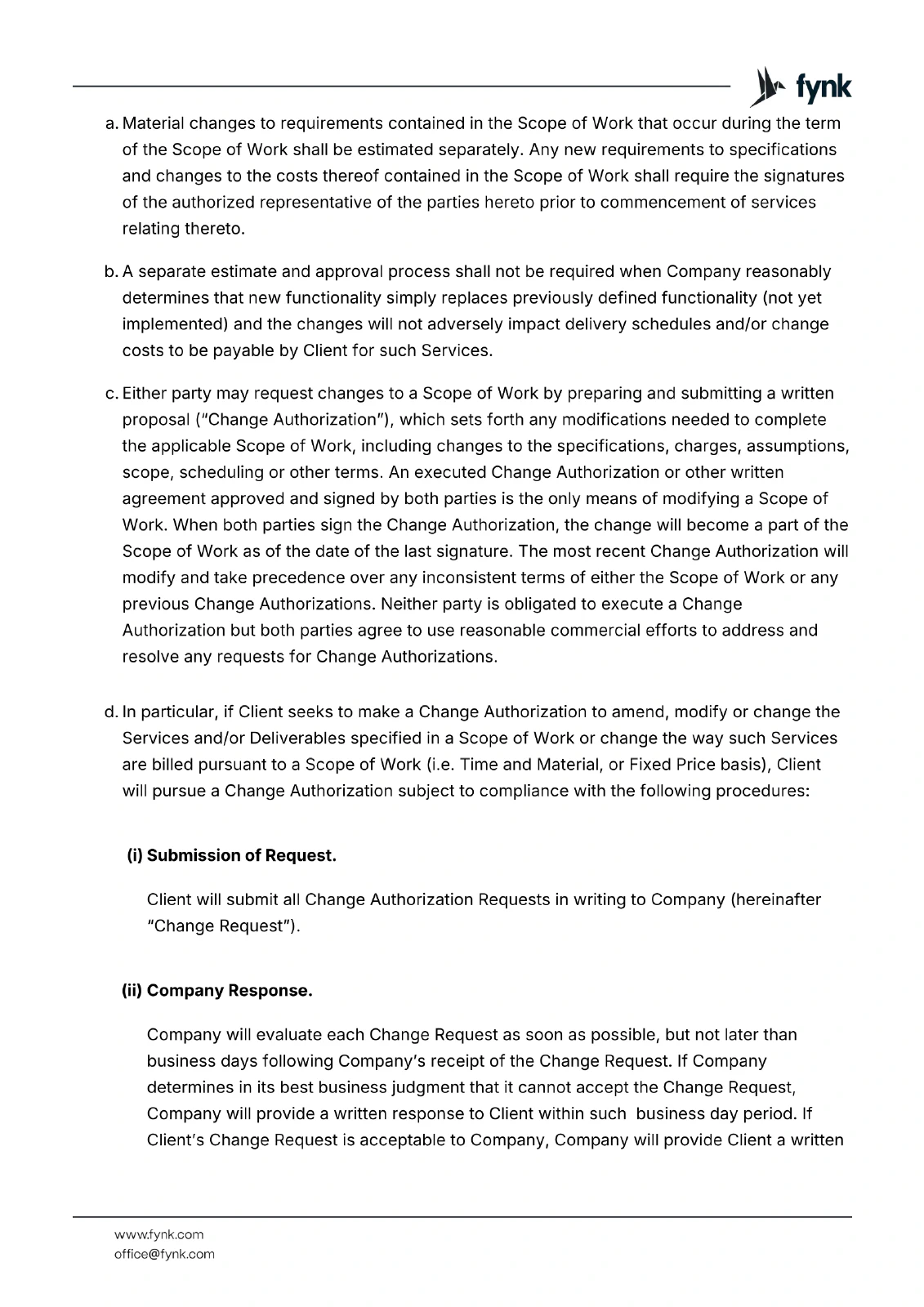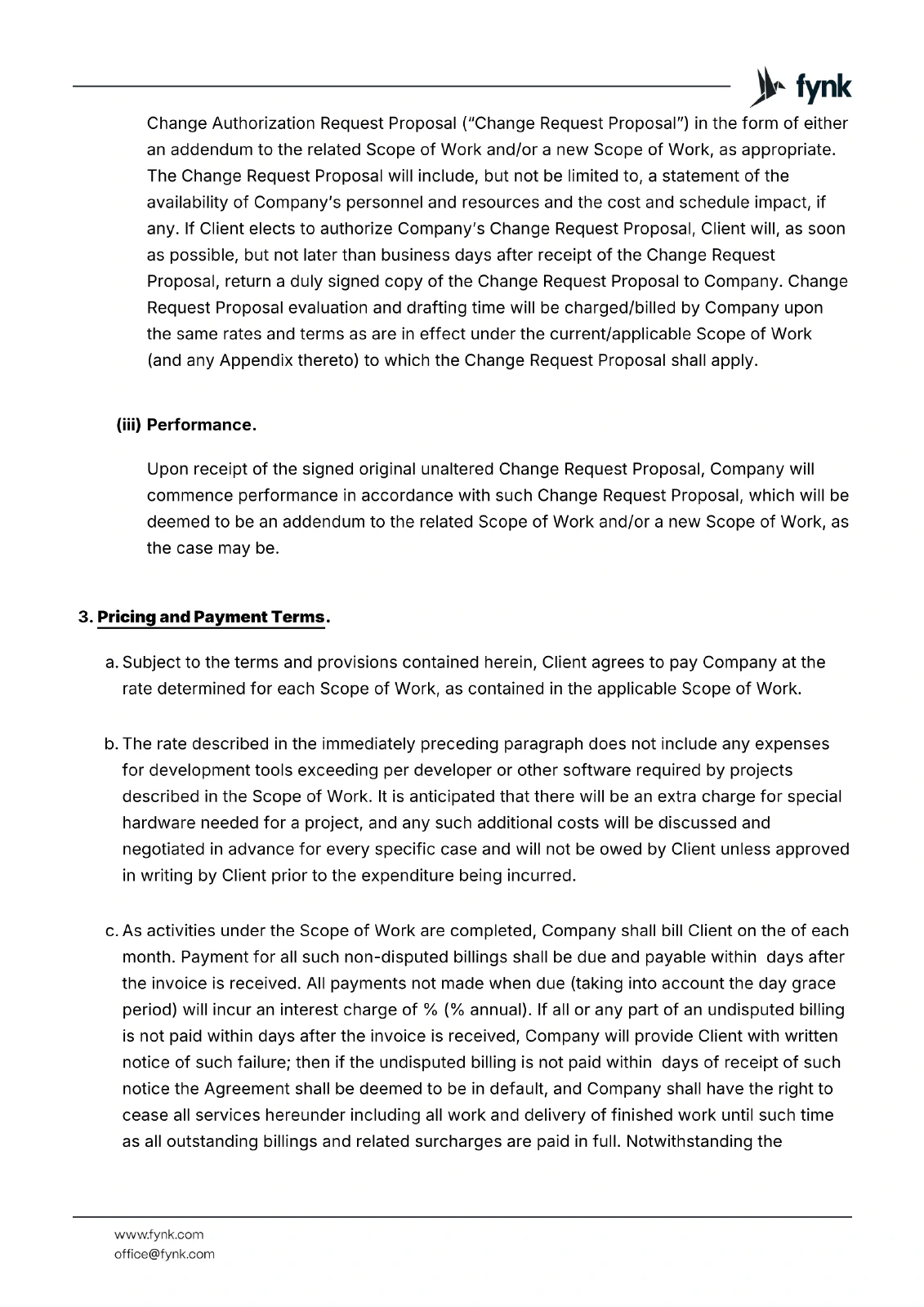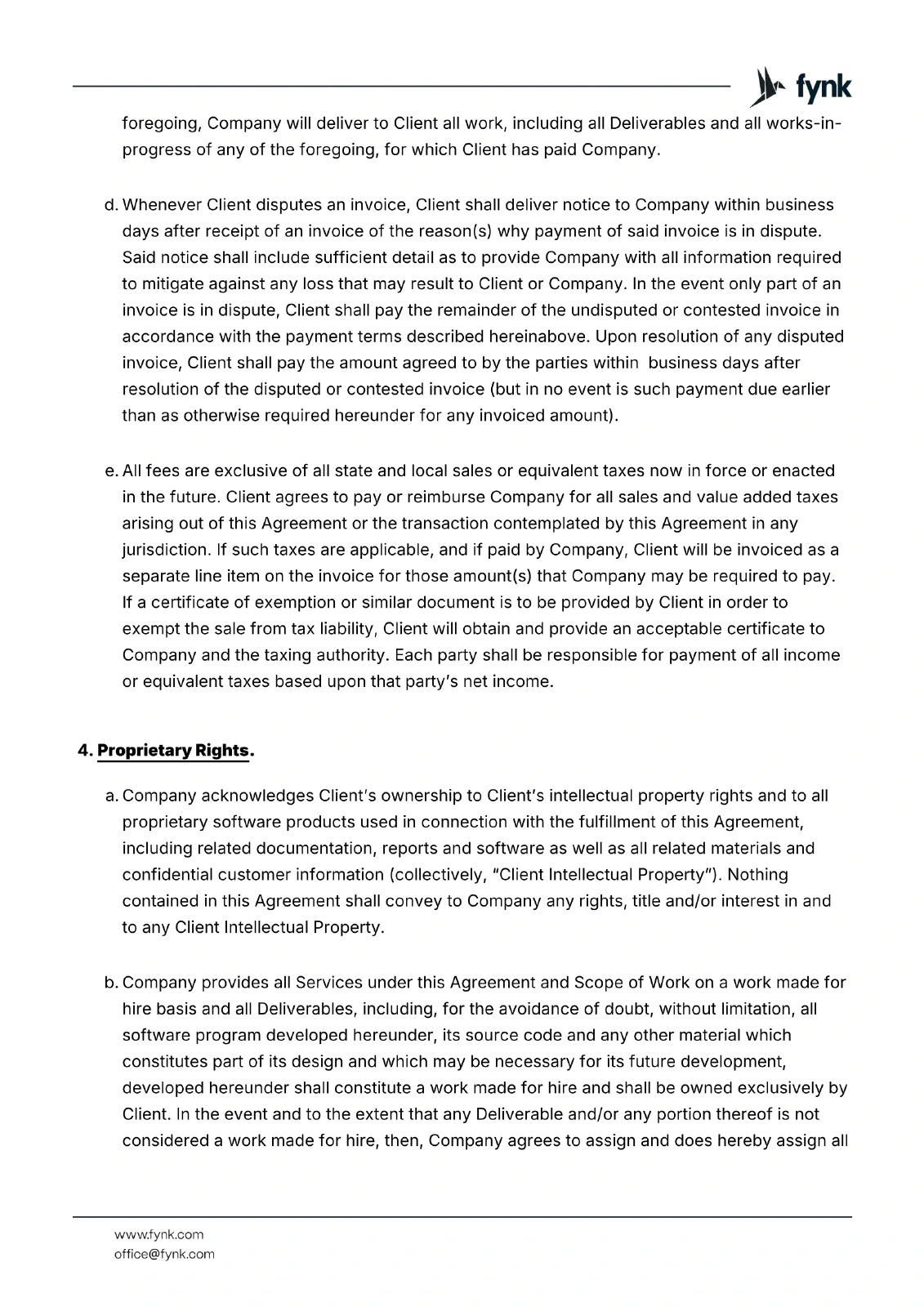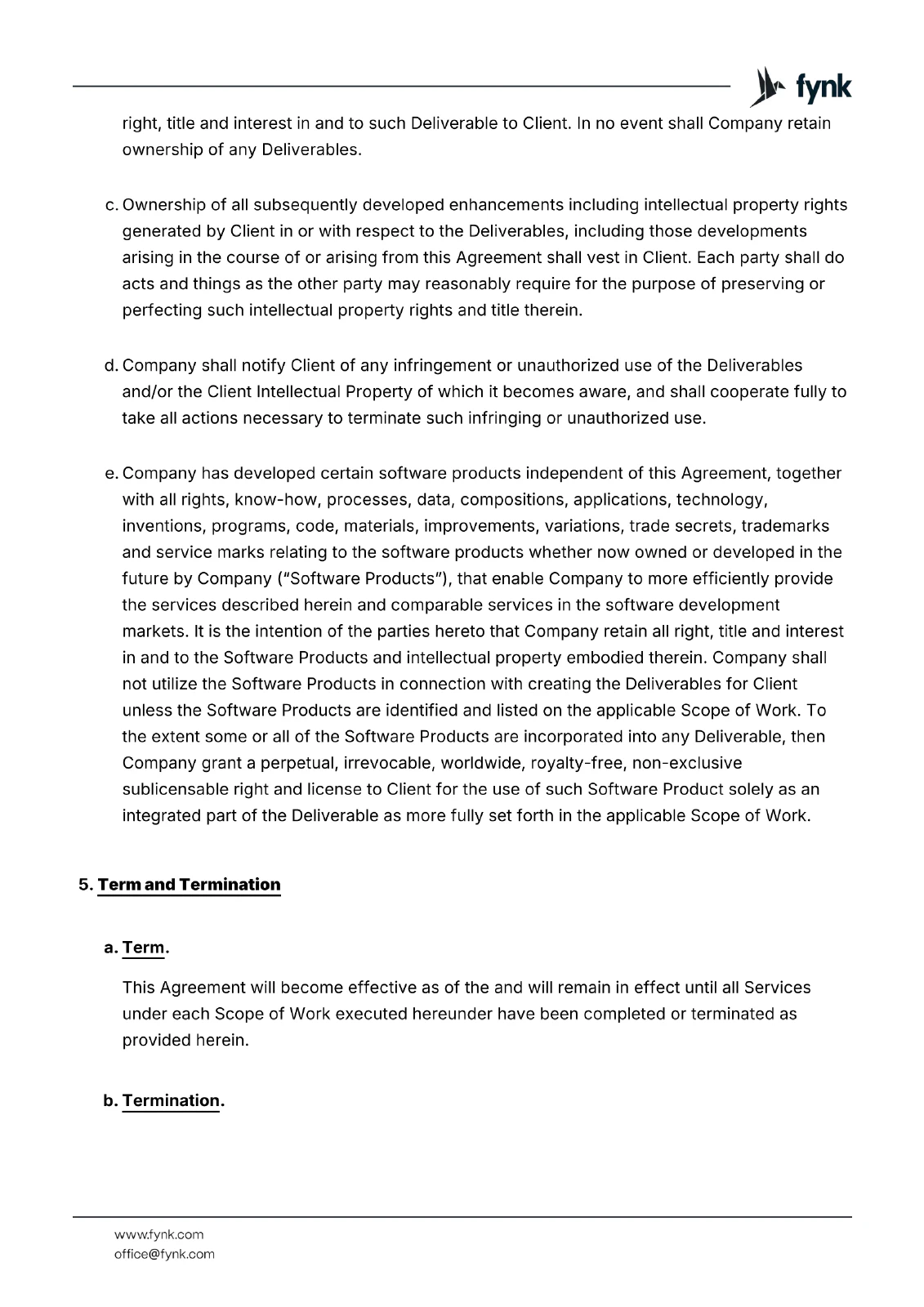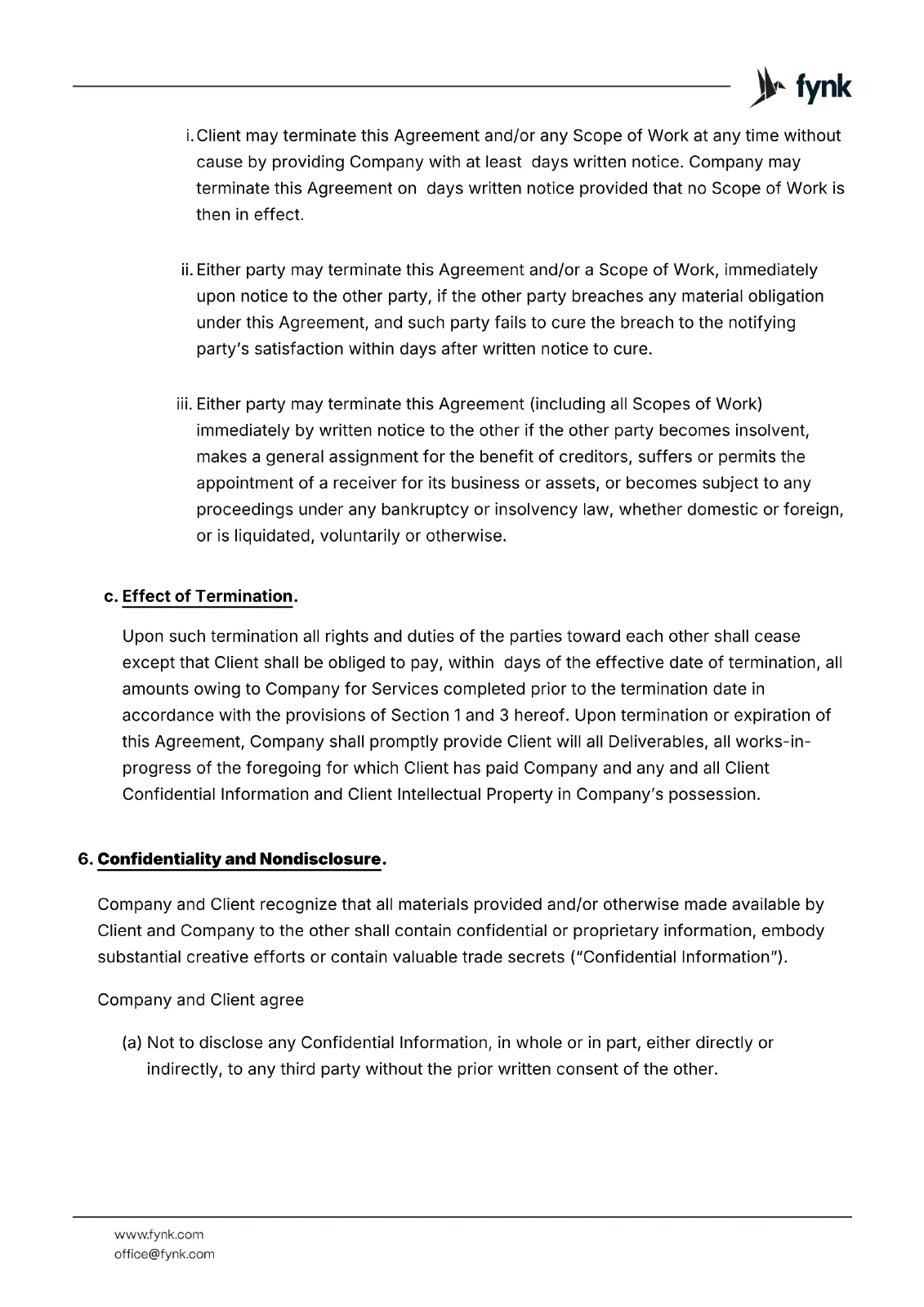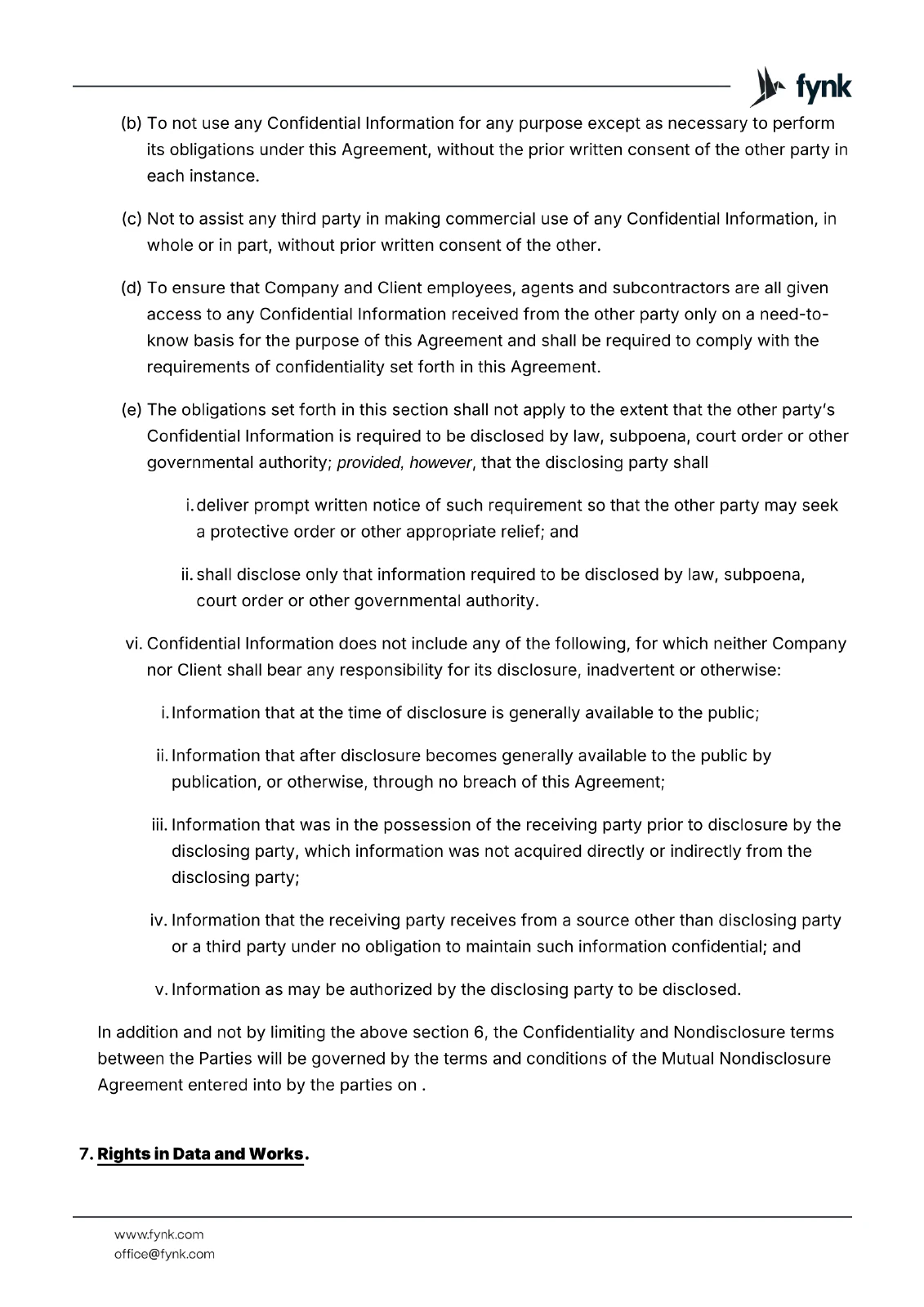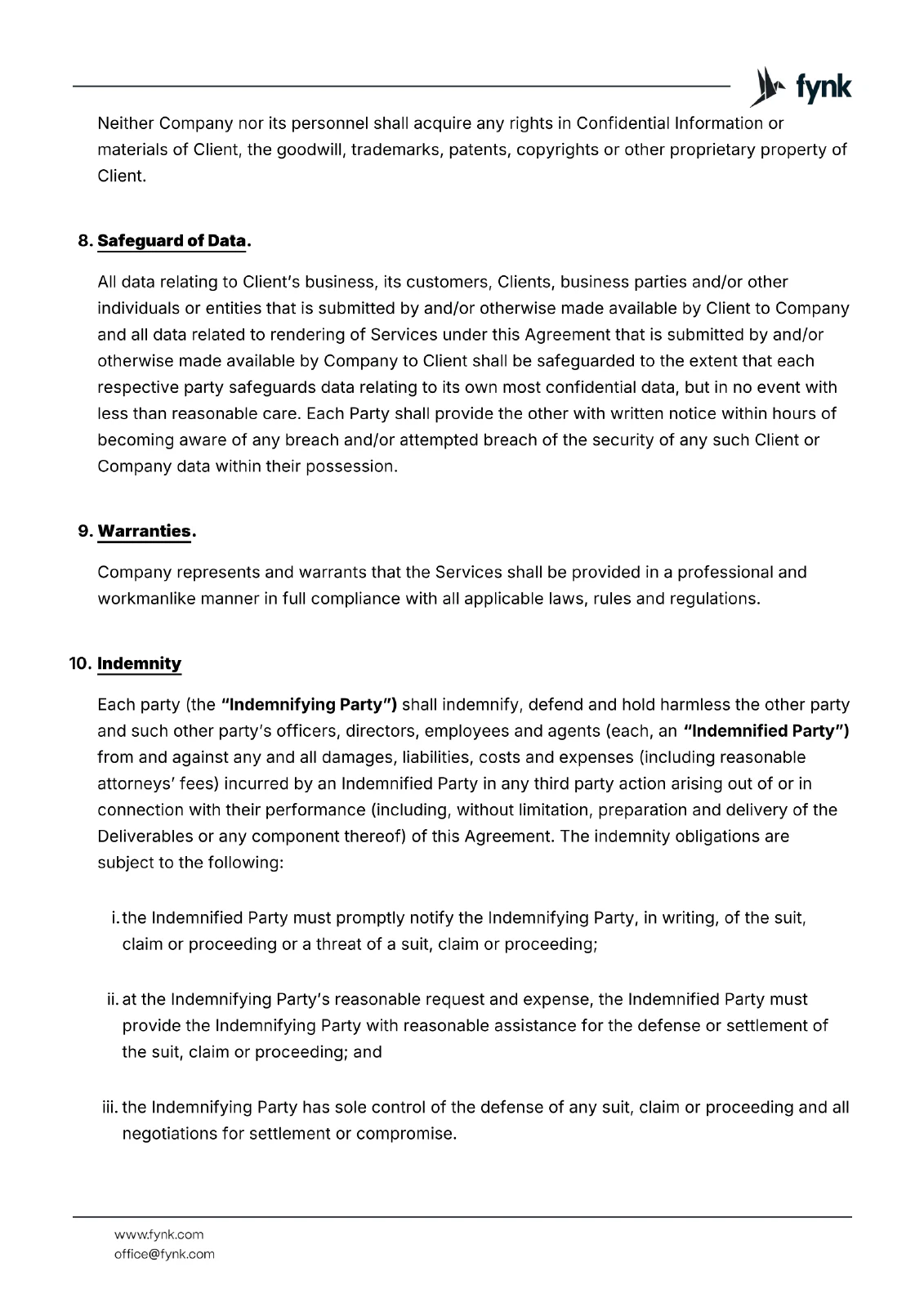Master Services Agreement
This Master Services Agreement (“Agreement”) is made effective as of by and between , a , having its principal place of business at (“Client”), and , a , having its principal place of business at , (“Company”).
Preliminary Statement
Client desires to obtain from Company software development and maintenance services, as well as other technical and service support, and Company agrees to provide these services for Client, subject to the terms and conditions contained herein.
NOW, THEREFORE, in consideration of the promises and mutual covenants herein contained, Client and Company agree as follows:
Agreement to Provide Services.
Client hereby retains Company to provide various professional services, including services to design, develop, test (QA) and maintain software, as such services are further described in individually executed Scope of Work documents, (each a “Scope of Work”). The first Scope of Work is attached hereto as Appendix A. The services to be performed by Company under each Scope of Work shall be referred to hereinafter as the “Services”. Except as otherwise set forth in the applicable Scope of Work, each Scope of Work shall be subject to the terms and conditions of this Agreement. Company agrees to perform all Services in accordance with each Scope of Work, subject to the terms and conditions of this Agreement. The term of a Scope of Work shall cover the period of time described in the Scope of Work for the performance of all Services to be performed thereunder. The term for each Scope of Work shall be as specified within the applicable Scope of Work.
Concurrent with the execution and delivery of this Agreement, Client and Company agree to execute the first Scope of Work as set forth in Appendix A, which is incorporated herein by this reference and made a part hereof.
In addition and not by way of limitation to the Services described above and in each Scope of Work, throughout the term of this Agreement, Company shall:
develop Client’s products and maintain them in accordance with specifications and approved coding conventions from time to time provided by Client to Company;
keep Client informed about on-going activities and deliveries; no later than each Tuesday during the term, send to Client a weekly status report containing a description of all activities completed during the prior week and a description of the time expended by Company in connection with such services;
assemble and make reasonable efforts to retain the same core team of software engineers throughout application development;
and provide a weekly delivery of source code, together with a script that can be run to prove that all code can actually be compiled and properly executed.
To the extent that a Scope of Work requires Company to prepare any new developments, works, customizations, work product or other deliverables (collectively, “Deliverables”) for Client, Company shall prepare and deliver to Client the Deliverables in accordance with this Agreement and the requirements of the applicable SCOPE OF WORK, including any acceptance process described in such Scope of Work. If the Scope of Work does not contain an acceptance procedure, then the following acceptance procedure in this Section will apply: Upon delivery of a Deliverable to Client in accordance with a SCOPE OF WORK, Client shall have business days (unless both parties mutually agree to an extension of this time to facilitate longer acceptance testing, approval of such extension of time not to be unreasonably withheld) to either accept or reject a Deliverable. If Client accepts the Deliverable, Client shall provide a written acceptance of such Deliverable to Company. If Client rejects the Deliverable, Client shall provide, at the time of rejection, a written statement to Company that identifies in reasonable detail the deficiencies of such Deliverable. If Client provides Company a notice of rejection for any Deliverable, Company shall modify such rejected Deliverable to correct the relevant deficiencies set forth in Client’s written notice of rejection and shall redeliver such Deliverable to Client within 0 days business days after Company’s receipt of such notice of rejection, unless otherwise agreed in writing by the parties. Thereafter, the parties shall repeat the process set forth in this Section until Company’s receipt of Client’s written acceptance of such corrected Deliverable (each such Client’s written acceptance of each Deliverable referred to as “Deliverable Acceptance”) or after three (3) iterations, whichever occurs first. If the Deliverables are not accepted by Client after three (3) iterations, then Client may terminate the applicable Scope of Work upon written notice to Company.
Changes to Specifications.
Material changes to requirements contained in the Scope of Work that occur during the term of the Scope of Work shall be estimated separately. Any new requirements to specifications and changes to the costs thereof contained in the Scope of Work shall require the signatures of the authorized representative of the parties hereto prior to commencement of services relating thereto.
A separate estimate and approval process shall not be required when Company reasonably determines that new functionality simply replaces previously defined functionality (not yet implemented) and the changes will not adversely impact delivery schedules and/or change costs to be payable by Client for such Services.
Either party may request changes to a Scope of Work by preparing and submitting a written proposal (“Change Authorization”), which sets forth any modifications needed to complete the applicable Scope of Work, including changes to the specifications, charges, assumptions, scope, scheduling or other terms. An executed Change Authorization or other written agreement approved and signed by both parties is the only means of modifying a Scope of Work. When both parties sign the Change Authorization, the change will become a part of the Scope of Work as of the date of the last signature. The most recent Change Authorization will modify and take precedence over any inconsistent terms of either the Scope of Work or any previous Change Authorizations. Neither party is obligated to execute a Change Authorization but both parties agree to use reasonable commercial efforts to address and resolve any requests for Change Authorizations.
In particular, if Client seeks to make a Change Authorization to amend, modify or change the Services and/or Deliverables specified in a Scope of Work or change the way such Services are billed pursuant to a Scope of Work (i.e. Time and Material, or Fixed Price basis), Client will pursue a Change Authorization subject to compliance with the following procedures:
Submission of Request.
Client will submit all Change Authorization Requests in writing to Company (hereinafter “Change Request”).
Company Response.
Company will evaluate each Change Request as soon as possible, but not later than business days following Company’s receipt of the Change Request. If Company determines in its best business judgment that it cannot accept the Change Request, Company will provide a written response to Client within such business day period. If Client’s Change Request is acceptable to Company, Company will provide Client a written Change Authorization Request Proposal (“Change Request Proposal”) in the form of either an addendum to the related Scope of Work and/or a new Scope of Work, as appropriate. The Change Request Proposal will include, but not be limited to, a statement of the availability of Company’s personnel and resources and the cost and schedule impact, if any. If Client elects to authorize Company’s Change Request Proposal, Client will, as soon as possible, but not later than business days after receipt of the Change Request Proposal, return a duly signed copy of the Change Request Proposal to Company. Change Request Proposal evaluation and drafting time will be charged/billed by Company upon the same rates and terms as are in effect under the current/applicable Scope of Work (and any Appendix thereto) to which the Change Request Proposal shall apply.
Performance.
Upon receipt of the signed original unaltered Change Request Proposal, Company will commence performance in accordance with such Change Request Proposal, which will be deemed to be an addendum to the related Scope of Work and/or a new Scope of Work, as the case may be.
Pricing and Payment Terms.
Subject to the terms and provisions contained herein, Client agrees to pay Company at the rate determined for each Scope of Work, as contained in the applicable Scope of Work.
The rate described in the immediately preceding paragraph does not include any expenses for development tools exceeding per developer or other software required by projects described in the Scope of Work. It is anticipated that there will be an extra charge for special hardware needed for a project, and any such additional costs will be discussed and negotiated in advance for every specific case and will not be owed by Client unless approved in writing by Client prior to the expenditure being incurred.
As activities under the Scope of Work are completed, Company shall bill Client on the of each month. Payment for all such non-disputed billings shall be due and payable within days after the invoice is received. All payments not made when due (taking into account the day grace period) will incur an interest charge of % (% annual). If all or any part of an undisputed billing is not paid within days after the invoice is received, Company will provide Client with written notice of such failure; then if the undisputed billing is not paid within days of receipt of such notice the Agreement shall be deemed to be in default, and Company shall have the right to cease all services hereunder including all work and delivery of finished work until such time as all outstanding billings and related surcharges are paid in full. Notwithstanding the foregoing, Company will deliver to Client all work, including all Deliverables and all works-in-progress of any of the foregoing, for which Client has paid Company.
Whenever Client disputes an invoice, Client shall deliver notice to Company within business days after receipt of an invoice of the reason(s) why payment of said invoice is in dispute. Said notice shall include sufficient detail as to provide Company with all information required to mitigate against any loss that may result to Client or Company. In the event only part of an invoice is in dispute, Client shall pay the remainder of the undisputed or contested invoice in accordance with the payment terms described hereinabove. Upon resolution of any disputed invoice, Client shall pay the amount agreed to by the parties within business days after resolution of the disputed or contested invoice (but in no event is such payment due earlier than as otherwise required hereunder for any invoiced amount).
All fees are exclusive of all state and local sales or equivalent taxes now in force or enacted in the future. Client agrees to pay or reimburse Company for all sales and value added taxes arising out of this Agreement or the transaction contemplated by this Agreement in any jurisdiction. If such taxes are applicable, and if paid by Company, Client will be invoiced as a separate line item on the invoice for those amount(s) that Company may be required to pay. If a certificate of exemption or similar document is to be provided by Client in order to exempt the sale from tax liability, Client will obtain and provide an acceptable certificate to Company and the taxing authority. Each party shall be responsible for payment of all income or equivalent taxes based upon that party’s net income.
Proprietary Rights.
Company acknowledges Client’s ownership to Client’s intellectual property rights and to all proprietary software products used in connection with the fulfillment of this Agreement, including related documentation, reports and software as well as all related materials and confidential customer information (collectively, “Client Intellectual Property”). Nothing contained in this Agreement shall convey to Company any rights, title and/or interest in and to any Client Intellectual Property.
Company provides all Services under this Agreement and Scope of Work on a work made for hire basis and all Deliverables, including, for the avoidance of doubt, without limitation, all software program developed hereunder, its source code and any other material which constitutes part of its design and which may be necessary for its future development, developed hereunder shall constitute a work made for hire and shall be owned exclusively by Client. In the event and to the extent that any Deliverable and/or any portion thereof is not considered a work made for hire, then, Company agrees to assign and does hereby assign all right, title and interest in and to such Deliverable to Client. In no event shall Company retain ownership of any Deliverables.
Ownership of all subsequently developed enhancements including intellectual property rights generated by Client in or with respect to the Deliverables, including those developments arising in the course of or arising from this Agreement shall vest in Client. Each party shall do acts and things as the other party may reasonably require for the purpose of preserving or perfecting such intellectual property rights and title therein.
Company shall notify Client of any infringement or unauthorized use of the Deliverables and/or the Client Intellectual Property of which it becomes aware, and shall cooperate fully to take all actions necessary to terminate such infringing or unauthorized use.
Company has developed certain software products independent of this Agreement, together with all rights, know-how, processes, data, compositions, applications, technology, inventions, programs, code, materials, improvements, variations, trade secrets, trademarks and service marks relating to the software products whether now owned or developed in the future by Company (“Software Products”), that enable Company to more efficiently provide the services described herein and comparable services in the software development markets. It is the intention of the parties hereto that Company retain all right, title and interest in and to the Software Products and intellectual property embodied therein. Company shall not utilize the Software Products in connection with creating the Deliverables for Client unless the Software Products are identified and listed on the applicable Scope of Work. To the extent some or all of the Software Products are incorporated into any Deliverable, then Company grant a perpetual, irrevocable, worldwide, royalty-free, non-exclusive sublicensable right and license to Client for the use of such Software Product solely as an integrated part of the Deliverable as more fully set forth in the applicable Scope of Work.
Term and Termination
Term.
This Agreement will become effective as of the and will remain in effect until all Services under each Scope of Work executed hereunder have been completed or terminated as provided herein.
Termination.
Client may terminate this Agreement and/or any Scope of Work at any time without cause by providing Company with at least days written notice. Company may terminate this Agreement on days written notice provided that no Scope of Work is then in effect.
Either party may terminate this Agreement and/or a Scope of Work, immediately upon notice to the other party, if the other party breaches any material obligation under this Agreement, and such party fails to cure the breach to the notifying party’s satisfaction within days after written notice to cure.
Either party may terminate this Agreement (including all Scopes of Work) immediately by written notice to the other if the other party becomes insolvent, makes a general assignment for the benefit of creditors, suffers or permits the appointment of a receiver for its business or assets, or becomes subject to any proceedings under any bankruptcy or insolvency law, whether domestic or foreign, or is liquidated, voluntarily or otherwise.
Effect of Termination.
Upon such termination all rights and duties of the parties toward each other shall cease except that Client shall be obliged to pay, within days of the effective date of termination, all amounts owing to Company for Services completed prior to the termination date in accordance with the provisions of Section 1 and 3 hereof. Upon termination or expiration of this Agreement, Company shall promptly provide Client will all Deliverables, all works-in-progress of the foregoing for which Client has paid Company and any and all Client Confidential Information and Client Intellectual Property in Company’s possession.
Confidentiality and Nondisclosure.
Company and Client recognize that all materials provided and/or otherwise made available by Client and Company to the other shall contain confidential or proprietary information, embody substantial creative efforts or contain valuable trade secrets (“Confidential Information”).
Company and Client agree
Not to disclose any Confidential Information, in whole or in part, either directly or indirectly, to any third party without the prior written consent of the other.
To not use any Confidential Information for any purpose except as necessary to perform its obligations under this Agreement, without the prior written consent of the other party in each instance.
Not to assist any third party in making commercial use of any Confidential Information, in whole or in part, without prior written consent of the other.
To ensure that Company and Client employees, agents and subcontractors are all given access to any Confidential Information received from the other party only on a need-to-know basis for the purpose of this Agreement and shall be required to comply with the requirements of confidentiality set forth in this Agreement.
The obligations set forth in this section shall not apply to the extent that the other party’s Confidential Information is required to be disclosed by law, subpoena, court order or other governmental authority; provided, however, that the disclosing party shall
deliver prompt written notice of such requirement so that the other party may seek a protective order or other appropriate relief; and
shall disclose only that information required to be disclosed by law, subpoena, court order or other governmental authority.
Confidential Information does not include any of the following, for which neither Company nor Client shall bear any responsibility for its disclosure, inadvertent or otherwise:
Information that at the time of disclosure is generally available to the public;
Information that after disclosure becomes generally available to the public by publication, or otherwise, through no breach of this Agreement;
Information that was in the possession of the receiving party prior to disclosure by the disclosing party, which information was not acquired directly or indirectly from the disclosing party;
Information that the receiving party receives from a source other than disclosing party or a third party under no obligation to maintain such information confidential; and
Information as may be authorized by the disclosing party to be disclosed.
In addition and not by limiting the above section 6, the Confidentiality and Nondisclosure terms between the Parties will be governed by the terms and conditions of the Mutual Nondisclosure Agreement entered into by the parties on .
Rights in Data and Works.
Neither Company nor its personnel shall acquire any rights in Confidential Information or materials of Client, the goodwill, trademarks, patents, copyrights or other proprietary property of Client.
Safeguard of Data.
All data relating to Client’s business, its customers, Clients, business parties and/or other individuals or entities that is submitted by and/or otherwise made available by Client to Company and all data related to rendering of Services under this Agreement that is submitted by and/or otherwise made available by Company to Client shall be safeguarded to the extent that each respective party safeguards data relating to its own most confidential data, but in no event with less than reasonable care. Each Party shall provide the other with written notice within hours of becoming aware of any breach and/or attempted breach of the security of any such Client or Company data within their possession.
Warranties.
Company represents and warrants that the Services shall be provided in a professional and workmanlike manner in full compliance with all applicable laws, rules and regulations.
Indemnity
Each party (the “Indemnifying Party”) shall indemnify, defend and hold harmless the other party and such other party’s officers, directors, employees and agents (each, an “Indemnified Party”) from and against any and all damages, liabilities, costs and expenses (including reasonable attorneys’ fees) incurred by an Indemnified Party in any third party action arising out of or in connection with their performance (including, without limitation, preparation and delivery of the Deliverables or any component thereof) of this Agreement. The indemnity obligations are subject to the following:
the Indemnified Party must promptly notify the Indemnifying Party, in writing, of the suit, claim or proceeding or a threat of a suit, claim or proceeding;
at the Indemnifying Party’s reasonable request and expense, the Indemnified Party must provide the Indemnifying Party with reasonable assistance for the defense or settlement of the suit, claim or proceeding; and
the Indemnifying Party has sole control of the defense of any suit, claim or proceeding and all negotiations for settlement or compromise.
Unless the claim is attributable to software or other intellectual property provided by Client to Company (but not excepting claims arising from modifications or enhancements thereto by Company), Company shall indemnify, defend and hold Client, its affiliates and their respective directors, officers, agents and employees harmless from and against all claims, demands, damages and judgments, including court costs and attorneys’ fees, arising out of or based upon
any claim that the Services provided hereunder, any intellectual property resulting therefrom, including the Deliverables infringes any patent, copyright, trade secret or other proprietary right of any person or breaches any person’s contractual rights; and
any breach by Company of any, warranty, obligation or other agreement set forth in this agreement.
Independent Contractor.
Company’s relationship with Client is that of an independent contractor, and nothing in this Agreement should be construed to create a partnership, agency, joint venture or employment relationship.
Solicitation of Employees.
For the period beginning with the date of this Agreement and continuing for years following termination of this Agreement:
Client shall not make any offers of employment, employ, contract or otherwise engage the services of, or solicit business from, or otherwise retain Company’s employees or persons who were employees of Company during the Term.
Company shall not make any offers of employment, employ, contract or otherwise engage the services of, or solicit business from, or otherwise retain Client’s employees or persons who were employees of Client during the Term.
Client’s Obligations.
Client acknowledges that the completion of one or more of the Deliverables may depend on and require Client’s commitment of certain resources. This is especially relevant in connection with the acceptance testing of Deliverables. Client agrees to provide such resources as are necessary to fulfill its obligations under this Agreement and to timely complete and fulfill its required actions in order for Company to be able to fully comply with its obligations under this Agreement. Client’s failure to provide such resources and to timely fulfill such obligations shall not constitute a basis for the retention of payments and/or allegations of breach of contract by Client.
Force Majeure.
No liability shall result from the non-performance of any obligation under this Agreement caused by circumstances beyond the control of the non-performing party including, without limitation, natural catastrophes, extreme weather conditions, fire, war, strikes, hostilities, civil unrest, governmental interference, and embargoes (collectively, “Force Majeure”) for that period commencing from the time at which notice of the existence of the Force Majeure is given by the non-performing party and terminating when the Force Majeure has ended or would have ended had the non-performing party taken those steps which it could reasonably have been expected to take to overcome the Force Majeure provided it could be overcome. The Force Majeure shall automatically extend the period for performing the obligation under this Agreement of the non-performing party. If a Force Majeure continues for more than , either party may terminate the Scope of Work relating to Services impacted by the Force Majeure event.
Publicity.
Notwithstanding anything to the contrary in this Agreement, Company shall not use Client’s name, trademarks, services marks or logos in connection with any publicity or marketing materials without the prior written consent of Client in each instance.
Limitation of Liability.
Under no circumstances shall either party have any liability for any claim arising from or relating to this Agreement in excess of the amounts paid and payable to Company by Client pursuant to this Agreement. The amount paid does not pertain to those deliverables that have been accepted and approved by Client more than months prior to the claim. Neither party hereto shall have any liability for consequential, incidental, special, or indirect damages (including, without limitation, loss of profit and business opportunities) regardless of whether the party has been advised, or is aware, of the possibility of such damages. In no event shall the limitations on liability and exclusion of damages set forth in this Section 16 apply to damages and/or obligations arising out of Sections 6., 8., 10. and/or a party’s gross negligence and/or willful misconduct.
Loss Mitigation.
As a material provision of this Agreement, the parties hereto agree to act in a manner that will serve to mitigate any and all losses that may be incurred by the other party through the timely communication of any and all issues that may arise during the performance of services under this Agreement.
Non-Exclusive Engagement.
Company reserves the right to offer services of any kind or nature whatsoever to any person or entity as Company in its sole discretion, deems appropriate. Client acknowledges that this is a non-exclusive agreement, and Client is aware that Company markets its services to other Clients. No provision of this Agreement shall be construed as limiting or prohibiting Company’s performing similar services for any other Client.
Mediation and Arbitration.
In the event of a dispute between the parties arising from or relating to this Agreement, including, without limitation, construction, interpretation, implementation, or enforcement of this Agreement or the performance or breach of any provision in this Agreement, the parties shall meet and confer in good faith to resolve such dispute. In the event such efforts do not resolve the dispute within days from the date the dispute arises, either party may demand arbitration by the , before one arbitrator, under its then existing Commercial Arbitration Rules, such arbitration to be final, conclusive, and binding. Judgment on the award rendered by the arbitrator may be entered by any court having proper jurisdiction. The arbitrator shall base his/her award on the terms of this Agreement, and he/she will follow relevant and applicable law and judicial precedents. The arbitrator shall render the award in writing and, unless both parties agree otherwise, shall include an explanation of the reasons for his/her award, the findings of fact and conclusions of law upon which his/her award is based. Notwithstanding the foregoing, any party may seek or assert entitlement to injunctive relief or specific performance in court as an initial matter and shall have no prior obligation to establish in arbitration the entitlement to injunctive relief or specific performance. The arbitration would take place in .
Survival.
Sections 3., 4.., 5.c., 6., 7., 8., 10., 12., 15., 16. and 18. through 30. will survive termination of this Agreement.
Notices.
All notices or other communications required or permitted hereunder shall be in writing and shall be sufficiently given if delivered personally or by overnight courier, addressed as follows:
If to Client:
If to Company:
Any party hereto may specify in writing a different address for such purposes by notice to the other party. Notices shall be deemed to have been delivered upon the earlier of actual receipt or the second business day following the day notice is given by overnight courier.
Assignment.
Neither this Agreement nor any right hereunder or interest herein may be assigned or transferred by Company without the express written consent of Client.
Choice of Law.
This Agreement shall be governed by and construed in accordance with the internal laws of , without regard to any laws of conflicts, and is executed and delivered by the parties hereto in .
Severability.
If any term or condition of this Agreement should be held invalid in any respect by a court, arbitrator or tribunal of competent jurisdiction, such invalidity shall not affect the validity of any other term or condition hereof. The parties hereto acknowledge that they would have executed this Agreement with any such invalid term or condition excluded.
Counterparts.
This Agreement may be originally executed and amended or modified by facsimile, by signatures attached to electronic communications, and in counterparts, each of which shall be deemed an original and all of which when taken together shall constitute one and the same Agreement.
Entire Agreement.
This Agreement supersedes any and all prior agreements between the parties regarding the subject matter hereof. This Agreement may be amended or modified from time to time, including the amendment or modification of one or more work schedules or change orders to the Scope of Work; provided, however, no amendment, modification or waiver of any provision of this Agreement, including, without limitation, any work schedule or change order to the Scope of Work, shall be effective unless it is in writing and signed by all parties to this Agreement.
Headings.
The headings set forth in this Agreement are for convenience only and do not qualify or affect the terms or conditions hereof.
Preliminary Statement.
The Preliminary Statement is incorporated herein by this reference and made a part hereof.
Attorneys’ Fees.
In the event of any dispute hereunder, the prevailing party shall be entitled to recover, in addition to any and all other remedies, which shall be cumulative, the reasonable attorneys’ fees, expenses, and costs which it incurs as a result thereof.
Construction.
This Agreement shall not be construed more strictly against any party hereto by virtue of the fact that the Agreement may have been drafted or prepared by such party or its counsel, it being recognized that all of the parties hereto have contributed substantially and materially to its preparation and that this Agreement has been the subject of and is the product of negotiations between the parties.
IN WITNESS WHEREOF, the parties hereto, intending to be legally bound hereby, have executed this Agreement as the day and year first above written.
Appendix A
Form of Statement of Work
This Statement of Work (“SOW”) is made effective as of the last date of signature below (the “SOW Effective Date”), by and between , a , having its principal place of business at (“Client”), and , a , having its principal place of business at , (“Company”) pursuant to the Master Services Agreement executed by the parties on (the “Master Agreement”).
Scope of Work
Company shall develop the application and in accordance with the high level functional requirements as described in Schedule 1. Tasks assigned to the project team members may be changed from time to time by the Client. The procedure for introducing changes to specifications or tasks assigned to the team members is agreed upon in paragraph 2 of the Master Agreement.
Term
The term of this SOW will be months, beginning on and ending on . At the end of the then current term of this SOW, the term shall automatically continue for an additional term of , unless either party gives the other days written notice prior to end of the then current term of its intention to terminate the services of Company under this SOW.
Fees and Staffing
Company will provide dedicated team of resources, working average hours/month per team member for Client. The price for each resource is or per developer. It is agreed that in the event Company employees work less than hours per month, excluding holidays and vacation, partial monthly billing will be calculated as follows:
Monthly charge per developer x (no of days developer works/Total number of days in the month).
For additional developers on assignments less than who are not members of the dedicated team will be billed at /hour.
When travel to Client location is required, Client will reimburse all reasonable travel related expenses for dedicated team such as necessary airfare, transportations, visa and healthcare coverage costs, per diem and lodging, provided that all such expenses are pre-approved by Company in writing.
Client will also cover Company per year and week(s) of paid vacation for every months worked on the Client project to Company employees that are on the Client development team.
The team will consist of the following members:
:
:
:
Company projects the following ramp-up plan through the end of :
PM | Tech Lead | Eng-1 | Eng-2 | Eng-3 | QA |
|---|---|---|---|---|---|
… | … | … | … | … | … |
… | … | … | … | … | … |
Grand total through the end of :
% of this total, , is due as contract binding amount at the time of execution of SOW.
Remaining of this payment shall be invoiced in early .
Overwork
Client and Company understand that due to the nature of services, it may be necessary for Company developers to work overtime on an occasional basis. The decision to work overtime has to be mutually agreed upon and approved by Client via e-mail or other written communication
At a mutually agreed decision, overwork will be either billed at a double rate (prorated hourly rate, which is ) or will be compensated through time off, which should be equal or greater than the amount of overwork time.
“Overwork” means work over [8] hours per day as well as work on weekends (Saturday, Sunday) and holidays.
Assumptions
To ensure project success, Client and Company agree to the following assumptions:
Client may allow Company access to Client’s systems in order to perform the Services. Company agrees that if such access is provided, Company will comply with Client’s access and security guidelines.
With Client’s permission, Company may use Client’s internal systems for managing the development process including but not limited to bug tracking systems, source code repository, documentation archives, schedule repositories.
Client will provide Company access to source code, data schemas and other technical documentation, technical staff as this is necessary for the performing of the Services.
Client will be reviewing/approving project documentation created by Company which relates either to software requirements or processes definition.
Both Company and Client will be providing timely feedbacks required to perform the Services.
Client personnel will be reasonably available for phone conferences at mutually agreed-upon times. Client and Company agree to make reasonable accommodation for any time difference between work locations.
Phone conferences should be expected between individual project teams (there may be multiple projects in progress at any one point) at an average rate of one per week or more often in order to insure tight integration.
Status reports will be provided by Company to Client not frequently than weekly to track the progress of individuals working on projects.
The foregoing is agreed upon as of
Schedule 1
Functional Requirements
This Schedule 1 (“Schedule”) is entered into pursuant to the Statement of Work (“SOW”) dated between (“CLIENT”) and (“Company”).
Project Overview
Provide a high-level description of the project.
Objectives
List the key objectives and goals of the project.
…
…
…
Scope of Work
Describe the scope of work to be delivered.
Deliverables
Identify the deliverables and expected outputs.
[add the list of deliverables here]
Functional Requirements
List the functional requirements of the project.
[Add requirement here]
…
Technical Requirements
Specify any technical constraints, platforms, or tools.
[Add requirement here]
…
Acceptance Criteria
Define how deliverables will be reviewed and accepted.
[Acceptance criterion 1]
…
…
Assumptions
Document assumptions relevant to this schedule.
[Assumption 1]
[Assumption 2]
Dependencies
Identify any dependencies on CLIENT or third parties.
[Dependency 1]
[Dependency 2]
Signatures
Agreed and accepted as of

